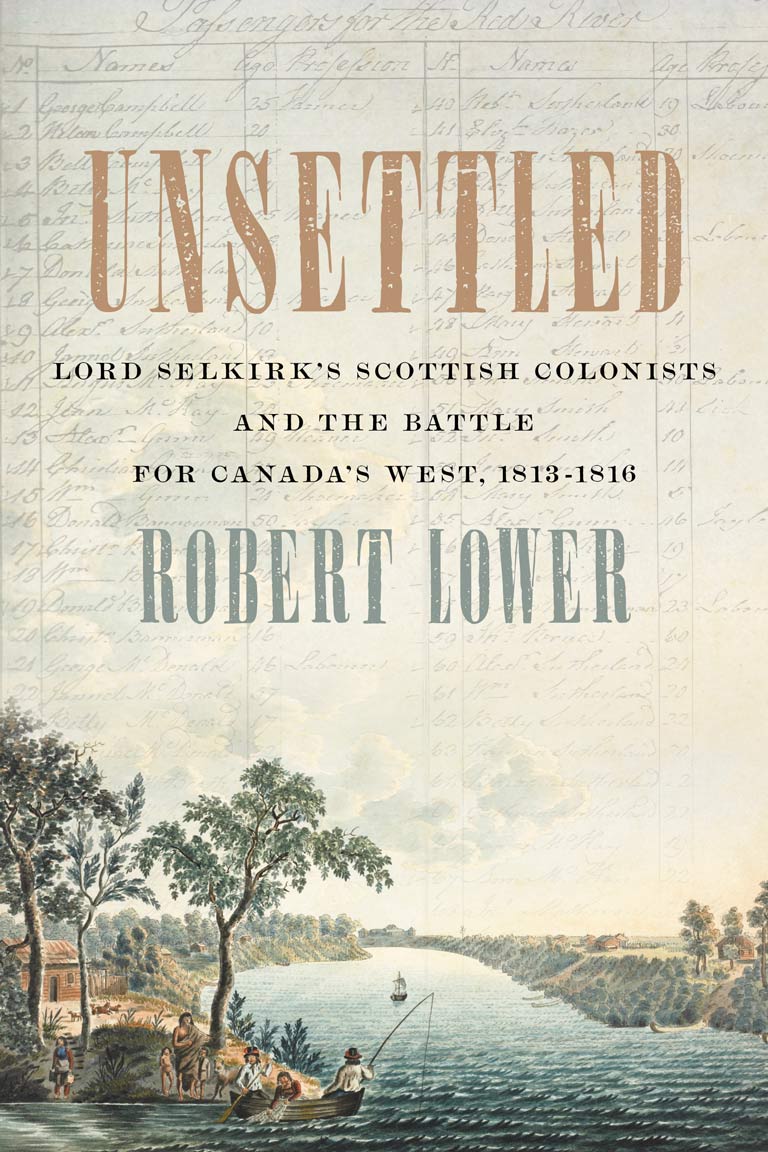Unsettled

Unsettled: Lord Selkirk’s Scottish Colonists and the Battle for Canada’s West, 1813–1816
by Robert Lower
ECW Press
348 pages, $29.95
The Selkirk Settlers, like their predecessors at Jamestown, Virginia, Quebec City, and Plymouth, Massachusetts, are one of those numerically small but historically imposing groups associated with the European colonizing project. And, like their seventeenth-century antecedents, Selkirk’s colonists experienced high hopes, internal conflict, tragedy, and a complex relationship with the Indigenous peoples among whom they settled. Their familiar story has now been freshly told by Robert Lower in his moving, personal, and often idiosyncratic book Unsettled.
Although Lower avers that his work is “not a history in any formal or academic sense,” he draws deeply on the Selkirk Papers at Library and Archives Canada, a collection that includes some twenty thousand numbered pages occupying eighty volumes. Lower has taken this collection of documents — letters, reports, inventories, petitions — and distilled them into a lively and readable narrative of thirty-one short, punchy chapters.
Lower fixes his tale on the axis of one day — June 19, 1816 — when twenty-two people were killed during the Battle of Seven Oaks, a violent altercation between fur traders of the Hudson’s Bay Company and its rival North West Company. Yet, when that fatal encounter is finally described, it is almost anticlimactic.
The true value of this work lies in the many details of life at Red River, the story of the establishment, dispersal, revival, and demise of the colony, and the account of the intricate and fraught relationships between the settlers, the Hudson’s Bay Company, the North West Company, and the Métis — and particularly within the Selkirk group itself. Lower writes that previous writers have missed “the pulsing life” in the Selkirk documents, and his work is enlivened by events such as a Christmas hurley game at Pembina, the Saulteaux leader Peguis’s visits to Fort Douglas, and Jean-Baptiste Lagimodière’s epic journey to Montreal with letters for Lord Selkirk.
With 7 uniquely curated newsletters to choose from, we have something for everyone.
Lower accentuates the drama by writing in the historical present. But he also does this by speculating about the inner thoughts of the historical figures he describes and by conjuring some lovely scenes from his imagination, such as a piper playing on the settlers’ first night at the site of their new home. Readers will be struck by many arresting turns of phrase — Colin Robertson shows the Métis “the velvet glove” before deciding to “flex the fist inside it” — but jarred by moments of jocular glibness — as John Bourke comes upon the unfolding Battle of Seven Oaks, he thinks “hellzapoppin!”
Lower also can’t resist romanticizing the group he calls “our colonists” and “these magnificent men and women,” whose weakness he identifies as their sense of fair play. This attitude hints at his own personal connection to the group: Lower’s ancestor Samuel Lamont was contracted to be the settlement’s millwright, and he laments the criticism by Miles MacDonnell (the first governor of Assiniboia) of Lamont as an “uncalled-for slash at my great-great-grandad.”
This perspective leads to some delicate historical and ethical positioning. Lower acknowledges that the Selkirk Settlers were precursors to the dispossession of Indigenous peoples, but he does not hold them culpable, emphasizing that they were themselves victims of the crime of the Highland clearances (the forced evictions of inhabitants of the Scottish Highlands in the eighteenth and nineteenth centuries).
Unsettled contains ten useful maps, eight pages of coloured plates, and several images from the original Selkirk manuscripts. One wishes, though, that the wider historical context was described more fully. The reliance on the Selkirk Papers as almost the sole source means that we often see the individual hairs on the hide of the bison but fail to perceive the full animal, let alone the plains on which it roams.
We hope you’ll help us continue to share fascinating stories about Canada’s past by making a donation to Canada’s History Society today.
We highlight our nation’s diverse past by telling stories that illuminate the people, places, and events that unite us as Canadians, and by making those stories accessible to everyone through our free online content.
We are a registered charity that depends on contributions from readers like you to share inspiring and informative stories with students and citizens of all ages — award-winning stories written by Canada’s top historians, authors, journalists, and history enthusiasts.
Any amount helps, or better yet, start a monthly donation today. Your support makes all the difference. Thank you!
Themes associated with this article
Advertisement
Save as much as 40% off the cover price! 4 issues per year as low as $29.95. Available in print and digital. Tariff-exempt!




